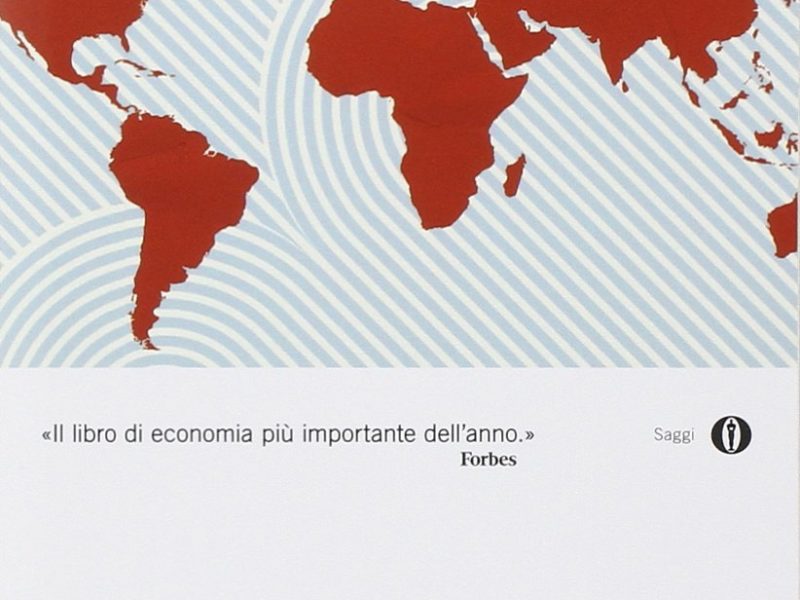“The new geography of jobs” by enrico moretti
 The new geography of jobs
The new geography of jobs The book
In the United States, the post-industrial knowledge and innovation-based economy is profoundly changing the labour market and creating enormous geographical disparities.
For certain regions and cities, globalisation and the spread of new technologies have resulted in an increased demand for work, more productivity, more employment and higher incomes. For other regions these trends have resulted in factories closing, unemployment and falling wages.
Enrico Moretti has drawn up a detailed map of this «new geography of jobs» that is taking hold in Europe and has discovered that every job created in centres of excellence for innovation generates at least five in other productive sectors, all of which are better paid than jobs elsewhere.
In this new scenario, Italy risks becoming a nation of declining cities and industrial districts, as demonstrated by the disappearance of two key industries –the computer and pharmaceutical industries.
Therefore, understanding why the economic differences between cities and regions continue to grow and why the most productive companies and workers can mainly be found in specific areas as opposed to others, is of vital importance for deciphering and orienting the future of our economy.
Taken from the first chapter...
Every year, millions of Chinese and Indian farmers leave their villages and move to sprawling urban centres to work in an ever-growing number of factories. Americans can’t help but observe, with a mix of awe and anxiety, the millions of manufacturing jobs created in those cavernous facilities, the constant flow of goods coming out of them, and the remarkable rise in standard of living that follows.
Infant mortality was high. Salaries and consumption were low. Household appliances like refrigerators and washing machines were rarities. The purchase of new shoes was a major event for most people. Only 2% of households had a TV. But over the next three decades, American society experienced one of the most impressive economic transformations in history. Salaries and incomes grew at an astonishing rate. Consumption exploded at all levels of society. An unprecedented sense of affluence and optimism pervaded most parts of the country…
The author
Enrico Moretti is an economics lecturer at the University of California in Berkeley who has received numerous international awards, including the 2006 Young Labour Economist Award from the German research institute Iza and, in 2008 the Carlo Alberto medal, an award that is assigned every to an Italian economist aged under 40. He was an advisor to Barack Obama and his articles often appear in leading American newspapers like the "New York Times" and "Wall Street Journal".
For "Forbes" ‘The new geography of jobs’ was the economics book of the year in 2012.
For me
I read the Italian translation of the book a couple of years ago. Even though the author is Italian, he writes in English and his research focuses on the situation in America which is more familiar to him than the situation in Italy …
I read it following a recommendation from a person that knows a lot about the labour market when I was finishing my second book on professional networking (“Connecting dots – Networking, questo sconosciuto”, bookabook, 2018).
I was immediately interested in the idea that there are locations that attract jobs. During the course of the interviews I conducted for my first book (“E’ facile cambiare lavoro se sai come fare”, bookabook, 2016), a client of mine – who’s from Sicily - argued that Milan is a city where things happen, where the situation is different than other cities in Italy. This is a topic I come across a lot in my job as a Career Coach when I’m working with people who want to take proactive steps in the labour market.
My own professional experience has taught me that certain jobs can be done in certain parts of the world but not in others. In the UK a Coach is a profession while in Italy you still need to tell people what it involves. More than 20 years ago a Project Manager was a profession in England, and in Italy people still weren’t familiar with Project Management certifications and even now people are not always sure about what this role actually entails.
Moretti’s main focus is on the technological revolution that now affects as all and he looks at the regions in the US specialising in one area (e.gg AI, IoT) or on one market (e.g. pharmaceutical, retail). This is particularly interesting if someone has professional relations with the US, even just with the aim of staying up to date (e.g. reading newsletters, keeping an eye on start-ups). Boston is obviously very different to San Francisco and expectations change based on the sectors they focus on respectively.
Another interesting aspect/idea is that these concentrations around cities can be seen in the US, Europe and Italy and especially that concentrations bring jobs to people specialising in the skills you can find in a specific city so the whole system benefits from it. For example, in Milan it’s not just people dealing with digital innovation, but also people providing services for them: be it bars or laundries… the latter may have a higher quantity and quality of professional opportunities than in other places.
In other words, migrations don’t only concern “migrants” – whom we hear about so much – as migration has been an important and interesting phenomenon for humanity over history, and continues to be so.
GoodGoing!
The professionals at GoodGoing! also keep abreast of change by reading. They are particularly interested in everything that has an impact on issues relating to employment, professions, professional opportunities and new jobs. This is why a book like this should be read and recommended. Enjoy!
